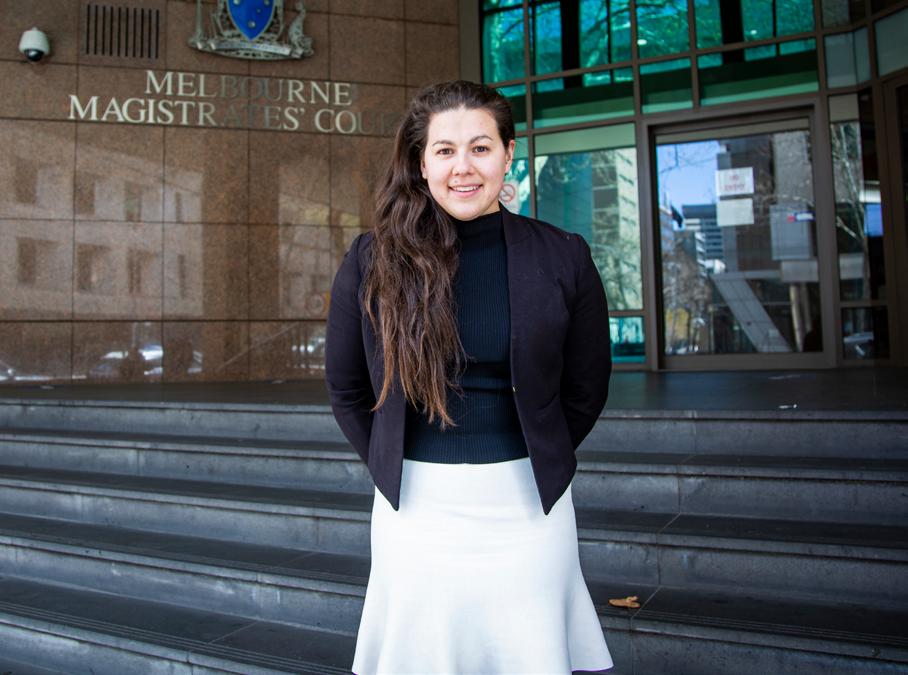
3 minute read
Turning lives around
Editorial and photography: Danielle Ford
Three years ago, Christie Bowker was addicted to drugs, disconnected from her family, homeless and facing the prospect of spending two years in jail as the result of her addiction and subsequent offending.
Now, the Melbourne resident is back in touch with her family, has regular accommodation and has been sober for more than 18 months.
“I started using recreational drugs when I was a teenager and it ended up getting worse to the point that I became addicted to meth and heroin. I was committing crimes to get money to support my addiction,” Ms Bowker said.
Following a string of drug driving and break and enter charges, Ms Bowker found herself once again before the Melbourne Magistrates’ Court in 2017 where she pleaded guilty and was eventually sentenced at Drug Court to a Drug Treatment Order (DTO).
“While being placed on the DTO meant I was able to stay out of jail, I still had to serve my sentence through treatment and supervision,” she said.
Drug Court, which currently operates at Melbourne and Dandenong magistrates’ courts, sees offenders who have pleaded guilty to drug-related offences being sentenced to a DTO rather than serving their sentence in jail.

Christie Bowker receiving her DTO completion certificate from Drug Court Magistrate Bernard Fitzgerald.
Drug Court is only an option for those sentenced to two years prison or less. Offenders also need to meet extensive eligibility criteria, including that the crime they committed cannot be a sexual offence or an offence involving bodily harm.
Victoria Police Prosecutions lawyer Ashleigh Gambera has seen countless people placed on DTOs during her time working in Drug Court and said while it can be viewed from the outside as an ‘easy option’ compared to jail, this was far from the case.
“The primary focus on Drug Court is rehabilitation and that’s not an easy thing for people who are addicted to drugs,” Ms Gambera said.
“The program really makes people look at themselves and address the issues behind their drug addiction in order to tackle it – that’s not an easy thing to do.”

Prosecutions lawyer Ashleigh Gambera has seen first-hand the positive impacts Drug Court DTOs have on offenders’ lives.
The specific conditions of treatment and supervision of an offender placed on a DTO is primarily the responsibility of the Drug Court Magistrate.
As part of the DTO, a police prosecutor from Victoria Police is dedicated to each participant as part of a multi-disciplinary team consisting of case managers, clinical advisers and a defence lawyer, who all assist the Drug Court Magistrate in the supervision of the offender.
Ms Bowker said while the program was one of the most difficult things she had done, she was extremely grateful for the opportunity it afforded her to turn her life around.
“If I had just gone to jail, I don’t know if I would have got sober,” she said.
“By being placed on the order and having conditions put on me to attend treatment sessions and check in with police and the court, I was forced to look at myself and work hard to get clean so I could stay out of jail.”
If offenders breach any of the conditions imposed by the DTO, the order may be cancelled, and they then must serve the unexpired portion of their sentence in prison.
Melbourne Prosecutions Group Acting Inspector Richard Bowers said having offenders sentenced to DTOs so they can work towards rehabilitation plays a part in helping reduce crime in the community.
“Each person that goes through a DTO and successfully completes it means less crime in the community,” A/Insp Bowers said.
“A lot of these people are only committing crimes to support their drug addiction, so treating their addiction through the DTO is ultimately helping to remove crime from the community.”










